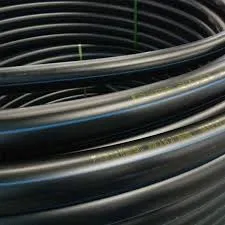Srp . 07, 2024 12:00 Back to list
Innovative Solutions for Efficient Water Management with High-Density Polyethylene Irrigation Pipes
The Benefits of HDPE Irrigation Pipes
Irrigation is a critical component of modern agriculture, enabling the efficient use of water resources to sustain crop production and promote food security. Among the various materials utilized for irrigation systems, High-Density Polyethylene (HDPE) pipes have gained significant popularity due to their numerous advantages. This article explores the key benefits of HDPE irrigation pipes, highlighting their role in enhancing agricultural efficiency and sustainability.
Durability and Longevity
One of the most significant advantages of HDPE pipes is their durability. Made from high-density polyethylene, these pipes are resistant to corrosion, abrasion, and impact. Unlike traditional materials such as metal or concrete, HDPE does not rust or deteriorate over time, which ensures a longer lifespan and reduces the need for frequent replacements. This durability is especially advantageous in agricultural settings, where pipes are often exposed to harsh environmental conditions, chemicals, and organic materials.
Flexibility and Versatility
HDPE pipes are highly flexible, allowing for easy installation and adaptability to various terrains. This flexibility enables the pipes to bend without breaking, making them suitable for uneven land and complex irrigation layouts. Whether for drip irrigation, sprinkler systems, or other agricultural applications, HDPE pipes can be tailored to meet the specific requirements of a field. Their versatility also extends to compatibility with other irrigation components, facilitating seamless integration into existing systems.
Cost-Effectiveness
Although the initial investment in HDPE irrigation pipes may be higher than traditional materials, their long-term benefits can lead to significant cost savings. The extended lifespan of HDPE pipes means lower maintenance and replacement costs over time. Additionally, their resistance to leaks and bursts minimizes water wastage, ultimately contributing to reduced water bills and improved resource management. Farmers can allocate their savings to other critical areas of their operations, enhancing overall productivity.
hdpe irrigation pipe

Environmentally Friendly
As the agricultural sector increasingly focuses on sustainability, HDPE pipes stand out as an environmentally friendly option. Being made from recyclable materials, HDPE pipes contribute to reducing plastic waste. Furthermore, the efficiency of HDPE irrigation systems helps conserve water, which is a precious resource in many parts of the world. By promoting precise water application, these systems not only benefit crops but also protect local ecosystems by minimizing runoff and preventing the depletion of water sources.
Resistance to Temperature Changes
Another notable advantage of HDPE pipes is their resistance to temperature fluctuations. They can withstand varying environmental conditions without losing structural integrity or performance. This resilience is crucial for irrigation systems, as they often operate in regions with extreme weather variations. Consequently, HDPE pipes can maintain their effectiveness regardless of the climate, ensuring reliable water delivery to crops throughout the growing season.
Improved Crop Yields
The application of HDPE irrigation pipes leads to more efficient water distribution, which can significantly enhance crop yields. By providing a consistent and controlled water supply, these pipes help optimize the amount of water delivered to plants, thereby promoting healthier growth and higher productivity. This efficiency is particularly vital in areas facing water scarcity, where maximizing water usage is essential for sustaining agricultural outputs.
Conclusion
In summary, HDPE irrigation pipes offer a wide range of benefits that make them an excellent choice for modern agricultural practices. Their durability, flexibility, and cost-effectiveness, combined with their environmental advantages, contribute to improved water management and enhanced crop yields. As farmers and agricultural professionals continue to seek innovative solutions to meet the challenges of water scarcity and sustainability, HDPE pipes will undoubtedly play a pivotal role in shaping the future of irrigation. Investing in this technology not only secures the longevity of irrigation systems but also promotes responsible resource use, ultimately supporting the agricultural sector's evolution toward a more sustainable paradigm.
-
Durable PP Rigid Sheet: Lightweight, Chemical Resistant Solutions
NewsAug.21,2025
-
PVC Grey Sheet for Extraction: Chemical Resistant & Durable
NewsAug.19,2025
-
Durable PVC Pipe Fittings for Plumbing & Irrigation Needs
NewsAug.18,2025
-
HDPE Steel Belt Reinforced Spiral Corrugated Pipe | High Strength
NewsAug.17,2025
-
HDPE Pipe Fittings: Durable, Leak-Proof Solutions
NewsAug.16,2025
-
Premium CPVC Sheet: High-Temp & Chemical Resistant Solutions
NewsAug.15,2025

